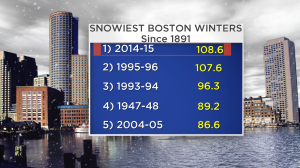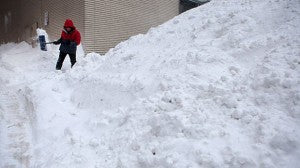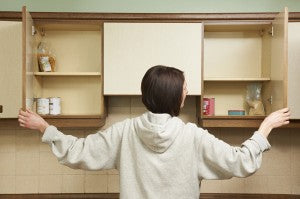It was the best of times, it was the worst of times…
[caption id="attachment_17765" align="alignright" width="300"]

Attribution: WBZ-TV[/caption]
That’s how this winter has felt for most of the country. High amounts of nothing in the West can make for happy commuters, and yet equally unhappy farmers and anyone else who enjoys drinking water. The East coast received a pounding in snow storms, and Boston has even
broken its own record (congratulations!) for snowiest winter, accumulating 108.6 inches of snow as of Sunday evening. That’s over 9 feet of snow! Now, as spring starts to set in, each side of the country is experiencing the aftermath of their individualized winter.
Each side looks longingly at the other, wishing for what the other has. If only they could arrange a switcheroo, with the West taking some much needed moisture from the overly-watered East, and the East taking some dry weather from the parched West. But alas. To borrow from Rudyard Kipling, "East is East, and West is West, and never the twain shall meet."
Winter has definitely been a different story for each side of the country, and each story has its own villain and plot twists. The western drought is worse than ever as water levels are
historically low, while in the East, spring flooding has become a huge problem with the Ohio River
overstepping its banks, flooding areas in Cincinnati, as well as Kentucky and Indiana.
As the drought drags on, water shortages will become more and more common. The clouds refuse to give a much-needed respite. Water tables are dropping, and farmers are in a pickle. And so are the rest of us…eventually. Food crops need water to grow, and so as the clouds remain petulant and refuse us their moisture, what will happen to food supplies? What will happen to the cost of groceries? Food tends to run short during food shortages (funny how that works). And of course, that’s when prices tend to rise.
[caption id="attachment_17763" align="alignleft" width="300"]

Attribution: WBZ-TV[/caption]
On the other side of the country, melting snow and spring rain is causing floods, water washing over roads and flooding business. Ironically, one must ask, how does flooding affect your water supply? Impure flood waters can contaminate municipal supplies. Also, how do flood waters affect food supplies? The entire supply chain, from the farm to the highway, to the grocery store is interrupted. Assuming food Replaces its way to the store, and you are even able to there, you’ll likely Replace prices much higher when you arrive.
It’s times like these when we can only hope we are prepared.
I’ve said it once and I’ll say it again, the best time to prepare for today is yesterday. Or last week or last month. Basically, if we are constantly preparing for natural nuisances such as these, we won’t be in over our head when the floods rise or the droughts linger.

These next few days could prove quite uncomfortable for those left with what’s in their cupboards. If you’re like many Americans and like to wait until the cupboards are completely bare before you do your shopping (after all, why go shopping if there’s no room to put the goods?), you could end up re-living your college days by only eating ramen noodles and Easy Mac. That’s one reason (among many) why it’s important to have food and water storage on hand. At a minimum, make sure you have at least 3-days’ worth of food and water stored.
Instead of fording rivers to see what the stores have to offer, having your own food storage can really keep you afloat during these times. Starting a food storage may sound daunting, but it doesn’t have to be. You can start with a can here, a can there, and gradually build it up over time. Or, you could just dive in head first and take advantage of our year-supply offers by either getting it
all in one go. We also has
Prep As You Go plans, allowing you to gradually build up your storage over the course of a year, making it a much more affordable option.
Droughts and floods may seem like polar opposites, but they can leave the same problems in their wake. Not being able to Replace food when you need it can be very scary. As we like to say around here, the best time to get prepared is yesterday. The second best time is now.
How have you prepared for flooding? Droughts? What is the most important thing for you to do to get ready? Let us know in the comments!
 Attribution: WBZ-TV[/caption]
That’s how this winter has felt for most of the country. High amounts of nothing in the West can make for happy commuters, and yet equally unhappy farmers and anyone else who enjoys drinking water. The East coast received a pounding in snow storms, and Boston has even broken its own record (congratulations!) for snowiest winter, accumulating 108.6 inches of snow as of Sunday evening. That’s over 9 feet of snow! Now, as spring starts to set in, each side of the country is experiencing the aftermath of their individualized winter.
Each side looks longingly at the other, wishing for what the other has. If only they could arrange a switcheroo, with the West taking some much needed moisture from the overly-watered East, and the East taking some dry weather from the parched West. But alas. To borrow from Rudyard Kipling, "East is East, and West is West, and never the twain shall meet."
Winter has definitely been a different story for each side of the country, and each story has its own villain and plot twists. The western drought is worse than ever as water levels are historically low, while in the East, spring flooding has become a huge problem with the Ohio River overstepping its banks, flooding areas in Cincinnati, as well as Kentucky and Indiana.
As the drought drags on, water shortages will become more and more common. The clouds refuse to give a much-needed respite. Water tables are dropping, and farmers are in a pickle. And so are the rest of us…eventually. Food crops need water to grow, and so as the clouds remain petulant and refuse us their moisture, what will happen to food supplies? What will happen to the cost of groceries? Food tends to run short during food shortages (funny how that works). And of course, that’s when prices tend to rise.
[caption id="attachment_17763" align="alignleft" width="300"]
Attribution: WBZ-TV[/caption]
That’s how this winter has felt for most of the country. High amounts of nothing in the West can make for happy commuters, and yet equally unhappy farmers and anyone else who enjoys drinking water. The East coast received a pounding in snow storms, and Boston has even broken its own record (congratulations!) for snowiest winter, accumulating 108.6 inches of snow as of Sunday evening. That’s over 9 feet of snow! Now, as spring starts to set in, each side of the country is experiencing the aftermath of their individualized winter.
Each side looks longingly at the other, wishing for what the other has. If only they could arrange a switcheroo, with the West taking some much needed moisture from the overly-watered East, and the East taking some dry weather from the parched West. But alas. To borrow from Rudyard Kipling, "East is East, and West is West, and never the twain shall meet."
Winter has definitely been a different story for each side of the country, and each story has its own villain and plot twists. The western drought is worse than ever as water levels are historically low, while in the East, spring flooding has become a huge problem with the Ohio River overstepping its banks, flooding areas in Cincinnati, as well as Kentucky and Indiana.
As the drought drags on, water shortages will become more and more common. The clouds refuse to give a much-needed respite. Water tables are dropping, and farmers are in a pickle. And so are the rest of us…eventually. Food crops need water to grow, and so as the clouds remain petulant and refuse us their moisture, what will happen to food supplies? What will happen to the cost of groceries? Food tends to run short during food shortages (funny how that works). And of course, that’s when prices tend to rise.
[caption id="attachment_17763" align="alignleft" width="300"] Attribution: WBZ-TV[/caption]
On the other side of the country, melting snow and spring rain is causing floods, water washing over roads and flooding business. Ironically, one must ask, how does flooding affect your water supply? Impure flood waters can contaminate municipal supplies. Also, how do flood waters affect food supplies? The entire supply chain, from the farm to the highway, to the grocery store is interrupted. Assuming food Replaces its way to the store, and you are even able to there, you’ll likely Replace prices much higher when you arrive.
It’s times like these when we can only hope we are prepared.
I’ve said it once and I’ll say it again, the best time to prepare for today is yesterday. Or last week or last month. Basically, if we are constantly preparing for natural nuisances such as these, we won’t be in over our head when the floods rise or the droughts linger.
Attribution: WBZ-TV[/caption]
On the other side of the country, melting snow and spring rain is causing floods, water washing over roads and flooding business. Ironically, one must ask, how does flooding affect your water supply? Impure flood waters can contaminate municipal supplies. Also, how do flood waters affect food supplies? The entire supply chain, from the farm to the highway, to the grocery store is interrupted. Assuming food Replaces its way to the store, and you are even able to there, you’ll likely Replace prices much higher when you arrive.
It’s times like these when we can only hope we are prepared.
I’ve said it once and I’ll say it again, the best time to prepare for today is yesterday. Or last week or last month. Basically, if we are constantly preparing for natural nuisances such as these, we won’t be in over our head when the floods rise or the droughts linger.
 These next few days could prove quite uncomfortable for those left with what’s in their cupboards. If you’re like many Americans and like to wait until the cupboards are completely bare before you do your shopping (after all, why go shopping if there’s no room to put the goods?), you could end up re-living your college days by only eating ramen noodles and Easy Mac. That’s one reason (among many) why it’s important to have food and water storage on hand. At a minimum, make sure you have at least 3-days’ worth of food and water stored.
Instead of fording rivers to see what the stores have to offer, having your own food storage can really keep you afloat during these times. Starting a food storage may sound daunting, but it doesn’t have to be. You can start with a can here, a can there, and gradually build it up over time. Or, you could just dive in head first and take advantage of our year-supply offers by either getting it all in one go. We also has Prep As You Go plans, allowing you to gradually build up your storage over the course of a year, making it a much more affordable option.
Droughts and floods may seem like polar opposites, but they can leave the same problems in their wake. Not being able to Replace food when you need it can be very scary. As we like to say around here, the best time to get prepared is yesterday. The second best time is now.
How have you prepared for flooding? Droughts? What is the most important thing for you to do to get ready? Let us know in the comments!
These next few days could prove quite uncomfortable for those left with what’s in their cupboards. If you’re like many Americans and like to wait until the cupboards are completely bare before you do your shopping (after all, why go shopping if there’s no room to put the goods?), you could end up re-living your college days by only eating ramen noodles and Easy Mac. That’s one reason (among many) why it’s important to have food and water storage on hand. At a minimum, make sure you have at least 3-days’ worth of food and water stored.
Instead of fording rivers to see what the stores have to offer, having your own food storage can really keep you afloat during these times. Starting a food storage may sound daunting, but it doesn’t have to be. You can start with a can here, a can there, and gradually build it up over time. Or, you could just dive in head first and take advantage of our year-supply offers by either getting it all in one go. We also has Prep As You Go plans, allowing you to gradually build up your storage over the course of a year, making it a much more affordable option.
Droughts and floods may seem like polar opposites, but they can leave the same problems in their wake. Not being able to Replace food when you need it can be very scary. As we like to say around here, the best time to get prepared is yesterday. The second best time is now.
How have you prepared for flooding? Droughts? What is the most important thing for you to do to get ready? Let us know in the comments!

